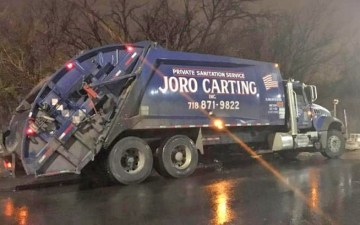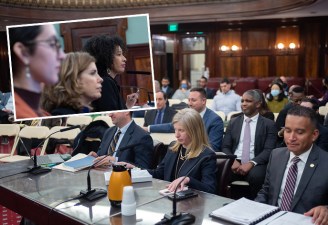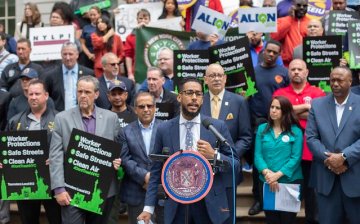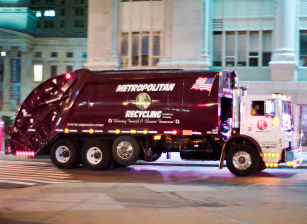EXCLUSIVE: Adams Administration Has Delayed Commercial Waste Reform That’s Required by Law
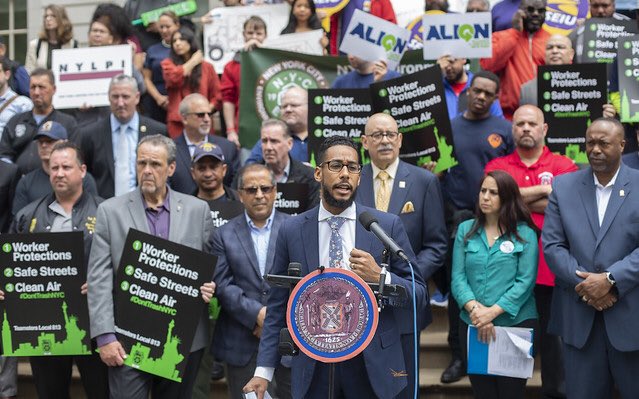
A City Council law requiring an overhaul of the rogue private carting industry has been thwarted by the Adams administration — and the person who led the program since its inception left the Department of Sanitation several months ago in “frustration” with how new DSNY Commissioner Jessica Tisch has deprioritized the effort, multiple sources told Streetsblog.
In 2019, the city struck a historic deal to create a new Commercial Waste Zone program in order to improve safety in the industry, creating 20 zones in which only a small number of private carters would be allowed to operate, replacing a free-for-all system and cut-throat competition that led to reckless driving and road fatalities. The Council-mandated reform effort also sought to dramatically reduce the miles traveled by the city’s carting fleet from 23 million per year to five million per year — a decrease of 78 percent.
But now, more than three years later, the program is stalled — and it’s not because of Covid or Mayor Adams’s citywide hiring freeze, but because of Tisch and Adams, according to the several sources who spoke with Streetsblog on the condition of anonymity for fear of retribution.
The Department of Sanitation pushed back on that assertion, but some facts do not appear to be in dispute.
At the request of the then-new mayor, for example, the city pushed back its own March, 2022 deadline for carting companies to answer the city’s Request for Proposals to participate in the program, one source familiar with the administration told Streetsblog. It’s now nearly a year later and the city is still “very limited to dotting its Is and crossing its Ts,” said another person familiar with the carting industry.
“But no real communication otherwise,” the person said.
After the delay, the RFP responses were finally due by July 15, 2022, but because of errors within submissions, the DSNY had carters submit what’s called a Best and Final Offer to fix those errors. Those were due Nov. 15, 2022, according to the agency’s own website.
And according to that same timeline, implementation for the first zones was supposed to start “Autumn 2022.” That came and went and it’s unclear where things stand, or if they’ve progressed at all.
“There are significant delays to this process. Covid was the original reason why we had to postpone, but now the city is operating in full, why continue with delays on the implementation?” asked Brooklyn Borough President and former Council Member Antonio Reynoso, who introduced and passed the initial Commercial Waste Zone law in 2019.
Reynoso says he doesn’t know the reason for the delays, but hopes to get answers during a Feb. 22 Council hearing on the program.
Michael Cristina, a partner and chief operating officer at Boro-Wide Recycling, which applied to participate in the program, told Streetsblog the last communication it had with the city was in October when his company submitted its offer.
Lew Dubuque, who heads the Northeast Region for the National Waste and Recycling Association, also said the last he heard from DSNY was in the fall. Earlier this week, he sent a letter to the commissioner, and hasn’t yet heard back.
He called the lack of communication from the city “concerning” and an “information vacuum” that he finds disquieting.
“We’re very concerned. and it’s really difficult for our members … there’s no stability going forward, they need to make budgetary decisions,” said Dubuque. “We offered to sit down and help put together a working group and help keep an open line of communication. We thought our members would hear something by now, but nothing, now we’re just stuck wondering. It’s very frustrating.”
Dubuque says he’s also heard about the city’s deprioritization when it comes to the program.
“I’ve heard through other people that’s an issue, that it’s not the focus right now,” he said.
And the head of one Manhattan business improvement district said the BID has similarly heard only silence from the city on implementing the program, and what it will mean for local businesses.
Department of Sanitation Deputy Commissioner Joshua Goodman admitted the program has hit a snag, but said any delays were due to the agency trying to get it “right.” He said the program is most definitely still in the works.
“DSNY is going ahead with this program, as required by law, and we are committed to getting it right. When Commissioner Tisch started nine months ago, the program was on the wrong track, and was on a path to failure,” said Goodman, referencing Los Angeles’s own similar program in 2017 that caused prices for businesses to skyrocket. “There was a very real chance it would go so poorly — as it did in Los Angeles — that the City Council would come under enormous pressure to repeal it, undermining years of advocacy. It would have been easy to come out swinging against the program, to write it off as impossible.”
Goodman said the DSNY, under Tisch, has put new safeguards in place to guarantee that costs do not similarly increase, has implemented a new outreach program to local businesses, and has also put the IT platform for commercial carter reporting “on the right track.”
One of the snags that Goodman did not mention is that the DSNY’s former director for the Bureau of Commercial Waste, Justin Bland, recently left the administration for the private sector, according to his public LinkedIn profile. Bland felt he was getting “iced out” after running the program from the ground up once Tisch took over, one source told Streetsblog.
“Justin is a very reasonable person. The fact that he left, he felt like he could no longer be effective,” said one person familiar with the administration.
Brooklyn Council Member Sandy Nurse, who chairs the Council’s Sanitation Committee, told Streetsblog that she has no idea why Bland left, but that he did a “phenomenal job.”
“He did a really excellent job ensuring all stakeholders were heard and their concerns were addressed as best as they could be,” said Nurse. “It’s unfortunate that he is no longer in that position, particularly as he holds so much knowledge of the conversations, the concerns, and the work that went into getting this over the finish line.”
After Bland left, Tisch did not directly replace him, but installed agency newcomer Frank Marshall to take over for Bland, while also overseeing several other agency initiatives, according to information from sources and the DSNY.
According to Marshall’s Linkedin profile, he joined DSNY in September 2022 after several years with the Department of Information Technology and Telecommunications — the same agency from which Tisch joined the DSNY. His title, Executive Director of the Program Management Office, makes no mention of Commercial Waste Zones.
Bland declined to comment to Streetsblog.
The sources say that just about half of the 38 budgeted positions for the program are now filled. But the DSNY says it has doubled headcount of full-time employees whose “primary work” is around Commercial Waste Zones from 13 to 26, according to Goodman.
It’s worth noting that the reform law passed in 2019 has no deadline for implementation — an “unfortunate situation” that leaves the Adams administration under no obligation to act quickly, one source said.
When Adams appointed Tisch as DSNY Commissioner in April 2022, she brought with her underlings from the previous agencies where she worked and had her own small circle of people she trusted. But the result was staffers like Bland quitting en masse.
“A lot of people at that level, at high levels, have left in the recent months with the new administration that came on in April 2022,” said one source, adding that it’s “not uncommon” for people to leave once a new agency chief comes on board.
But it’s not just Tisch who is slow-walking the program. It’s also Adams, who would rightly be concerned if a new program had the potential to increase costs on small businesses, sources told Streetsblog.
“The mayor really asked for this to be the initial delay, the industry convinced them they were not prepared,” said one source, who suggested that the industry overstated the cost concern. “The industry has known about this [the City Council’s move to reform the industry] for like five years or more.”
And for advocates who have long been fighting to rein in the notoriously dangerous industry, the delay is unacceptable and can have deadly consequences.
Just earlier this month, 58-year-old Diego Andrade was killed on Kings Highway in Brooklyn by the driver of Metropolitan Recycling — a mid-sized non-union privating carting company that advocates say would “absolutely would be subject to the safety standards” that are part of the law the DSNY is lagging behind on mandating.
“Yet another tragic fatality involving a private sanitation truck shows the urgent need to fully implement the new commercial waste zones system mandated by Local Law 199 of 2019 as soon as possible,” said Justin Wood, the director of policy at New York Lawyers for the Public Interest. “The new system has the potential to eliminate millions of unnecessary and dangerous truck miles on local streets, reduce overwork and fatigue for private sanitation workers, ensure that companies install modern safety equipment on trucks, and will give the City the leverage to hold waste haulers accountable to a comprehensive contract.”
In a statement to Streetsblog, a spokesperson for City Hall said the Adams administration is “committed” to getting the program “right and implementing it successfully” as required by the law.
“The CWZ program will reduce truck traffic on our streets and pick up trash more efficiently, while keeping New York City clean. We look forward to continuing the program implementation process,” the spokesperson said.
The City Council will hold a hearing on the program on Feb. 22.


